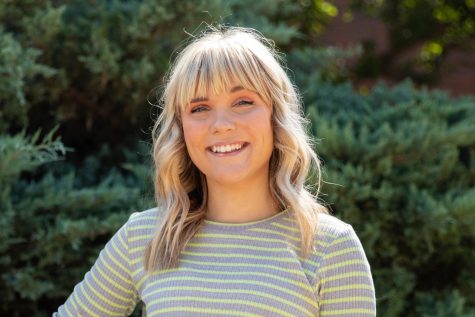Most students can’t utilize CAPS counseling while out of state, but they can still prioritize mental health
Dr. Jessica Provines, the director of counseling and prevention services, prepares to answer a question during an interview with The Sunflower inside of the Student Wellness Center on July 7.
While Zoom has given colleges many opportunities to get students involved no matter where they are on the globe, WSU’s Counseling and Prevention Services is a little more complicated. Due to licensing requirements, if students are wanting counseling— even if it’s virtual— they either have to be inside the state of Kansas or in a state that has granted CAPS temporary opportunity to practice.
“It’s a very confusing landscape right know with all the different states having different rules,” CAPS Director Jessica Provines said.
Even with this obstacle, CAPS wants students to know that there are still ways to make self care a priority.
“We have tried to support those kinds of students and those kinds of situations as best we can,” Provines said. “Students can still chat with one of us, or one of the CARE team case managers on campus who will try and connect them with their local resources in the state that they’re at if they’re wanting to get treatment in the state where they are.”
Even though it can get complicated receiving counseling from CAPS, out of state students can still utilize other CAPS resources.
“If they just maybe want some tips and want some helpful information, I really encourage all students to follow us on social media,” Provines said. “We continue to put out great content on a weekly basis, giving lots of free tips on how to cope.”
CAPS also provides a free mindfulness mediation class to help students stay grounded in this time of change. If students are wanting support, they have the opportunity to join a non clinical support group from out of state.
Provines said that students can also call the 1-800-273-8255 any where at any time for free mental health support. They can also text 741-741 if they don’t prefer to call.
‘Know your own boundaries’
CAPS is now giving the students the choice between Zoom counseling and in-person counseling, following the university decision to return to normal operation next semester.
For students who are utilizing in person services, the Student Wellness Center is still requiring masks.
“It seems like a lot of the community is opening up and not wearing masks anymore, but we are in a clinical space so we are definitely still taking those precautions,” Provines said.
While more in-person activities may serve as a ray of hope for many students, Provines recognized that this transition back to normal may be nerve wracking for some.
“We’ve gone through so much transition and change, and change is hard,” Provines said. “I recommend that people take it slowly, know your own boundaries.”
Provines said that students who are nervous about returning should take their time fully immersing themselves in normal activities.
“Maybe just go to a couple of things in person and kind of dip your toe in the water, see if you’re comfortable with it,” she said. “Give yourself time to establish a new routine.
“Respect your own boundaries [and] respect others boundaries,” she said. “Take it slow. Give yourself time.”
‘Be prepared’
CAPS is launching a campaign geared toward faculty and staff focused on preparing to support students during the transition back to normal. The tag line is “Be Prepared to Support Students’ Mental Health.”
“The thing that I really want to stress to instructors is to be prepared,” Provines said. “Many experts are anticipating that we are going to experience a wave of additional mental health concerns.
“One, because of the year we’ve been through … Another, just because we’ve had so much awareness and everyone is more comfortable now talking about mental health because we’ve all been through this very challenging thing that stressed our mental health.”
Provines said that she hopes instructors will be more welcoming of conversations in the classroom surrounding mental health.
“You know, talking about how we’re all in a transition period, and some [students] might have been really excited to get back in person where some might be really nervous,” she said.
While the COVID-19 pandemic has brought many challenges, Provines said a light in the dark is the mental health advocacy that has been introduced through it.
“I think we’re going to have more students willing to talk about their mental health, more students wanting to share their mental health histories with their instructor,” Provines said.

Lindsay Smith is the former editor-in-chief and newsletter editor for The Sunflower. Smith was a journalism major at Wichita State with a minor in creative...



















Khloé Zac • Jul 25, 2021 at 2:17 pm
Recovery Lost Funds From Online Scammer’s/ Cryptocurrency/ Recovery of Stolen bitcoin / Bitcoin Mining/ Increase your Credit score/ MOBILE SPY REMOTECONTROL ACCESS AUTHORIZATION. Removing Bad Records from Both Public and Private database: Email: Vitor(AT)programmer.net, WhatsApp contact: (+1) 519 / 398 / 1460